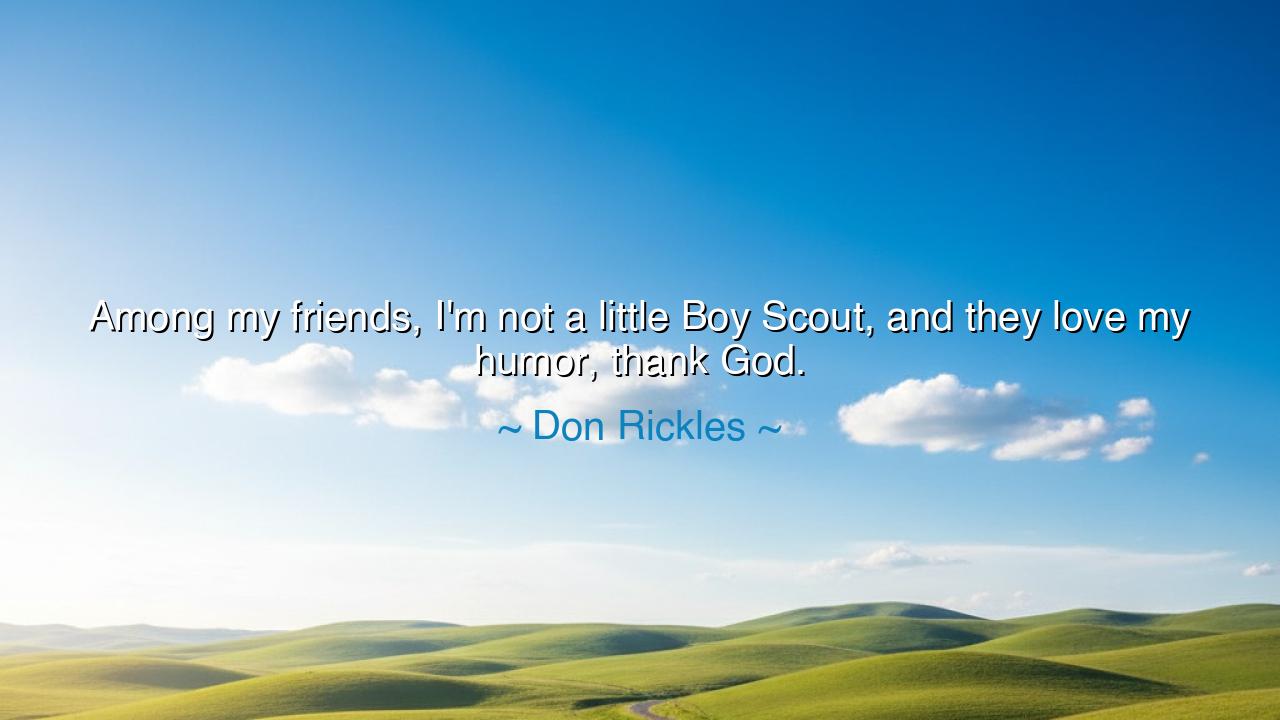
Among my friends, I'm not a little Boy Scout, and they love my






When Don Rickles said, “Among my friends, I'm not a little Boy Scout, and they love my humor, thank God,” he was not merely speaking of laughter, but of authenticity—of the courage to be oneself, unfiltered, unpolished, and true. In those few words, the great comedian revealed a wisdom that transcends entertainment: that honesty wrapped in humor is one of the highest expressions of friendship and of life itself. He was saying, in essence, “I am not perfect, I am not meek, I am not made of false politeness—but my friends love me for who I am.” This is not the boast of a man proud of his flaws, but the gratitude of one who has found love in truth.
The origin of this quote lies in Rickles’s long career as one of America’s most daring comedians. Known for his sharp tongue and fearless wit, he earned the nickname The Merchant of Venom. On stage, he roasted presidents, celebrities, and strangers alike, but always with a twinkle of affection behind the jab. His humor was not cruelty—it was courage. He could mock the mighty and humble alike, because behind the insult was a recognition of shared humanity. When he said he was “not a little Boy Scout,” he was admitting that his humor was bold, irreverent, sometimes biting—but never empty. And when he said, “they love my humor, thank God,” he was giving thanks that the people who truly knew him understood his heart beneath the laughter.
To be “not a little Boy Scout” is to reject the false purity of performance. It means refusing to wear a mask of goodness that hides the vibrant, messy truth of the self. The ancient philosophers, too, taught that virtue does not lie in pretending to be flawless, but in embracing one’s nature honestly. The wise Socrates once said, “The unexamined life is not worth living,” and Rickles, in his way, examined life through laughter. He held up a mirror to the world and said, “Look how ridiculous we all are!” His humor was not saintly—it was human, and therefore divine. His friends loved him because, through his imperfections, they saw their own, and found freedom in that recognition.
There is an echo of the ancient jesters in Rickles’s spirit—the ones who served in royal courts, mocking kings to remind them they were still mortal. The jester’s role was sacred: he was the only one who could speak truth wrapped in laughter, softening the blow of honesty with wit. Don Rickles carried that same mantle into the modern age. He laughed at everything—race, politics, celebrity, ego—and in doing so, he exposed the absurdity of division. His humor, though rough to the ear, was tender to the heart. Like the jesters of old, he taught that laughter can cleanse pride and humble the powerful, for no man can hold onto arrogance while laughing at himself.
Consider this truth: humor, when born from love, is the highest form of truth. Rickles’s humor was unfiltered but never cruel, because it was rooted in humanity. His friends knew that behind every joke was a heart that meant no harm. In the same way, true friendship thrives not on constant flattery, but on honesty. A real friend tells you when you’re being foolish—but makes you laugh while doing it. The laughter becomes the bridge between truth and love. Rickles’s friends “loved his humor” because it was his truest self—irreverent yet sincere, mischievous yet kind. In that laughter, they found connection, and he found grace.
To understand Rickles’s words is to understand the balance between truth and kindness. The world often teaches us to choose one or the other—to be gentle but false, or truthful but harsh. Rickles showed that through humor, one can be both. He spoke the truth but wrapped it in laughter, so it could be received with joy instead of pain. This is a skill worth mastering. To laugh at the self is to disarm pride; to make others laugh is to invite them to shed their defenses. Humor born from humility creates intimacy, while humor born from bitterness divides. Rickles chose the former, and that is why he was loved.
So, my children of wit and wonder, take this lesson from Don Rickles to heart: Be authentic, and let your humor spring from love, not ego. Do not strive to be a “little Boy Scout” in a world that prizes masks and perfection. Dare to be real—to laugh at your own absurdity, and to let others laugh with you. Surround yourself with those who can take your honesty and return it with affection, for these are the true companions of the soul. When you speak, let truth dance with laughter; when you jest, let compassion temper your words. In doing so, you will not only make others laugh—you will remind them what it means to be human.
And finally, remember this: gratitude is the heart of true humor. When Rickles said “thank God,” he was not just thankful for laughter, but for love—the love that forgives your rough edges and cherishes your soul anyway. May you live so that your own friends can say the same: “You are not perfect, but your laughter brings light—and thank God for it.” For in that laughter lies the essence of life itself: raw, honest, and utterly beautiful.






AAdministratorAdministrator
Welcome, honored guests. Please leave a comment, we will respond soon